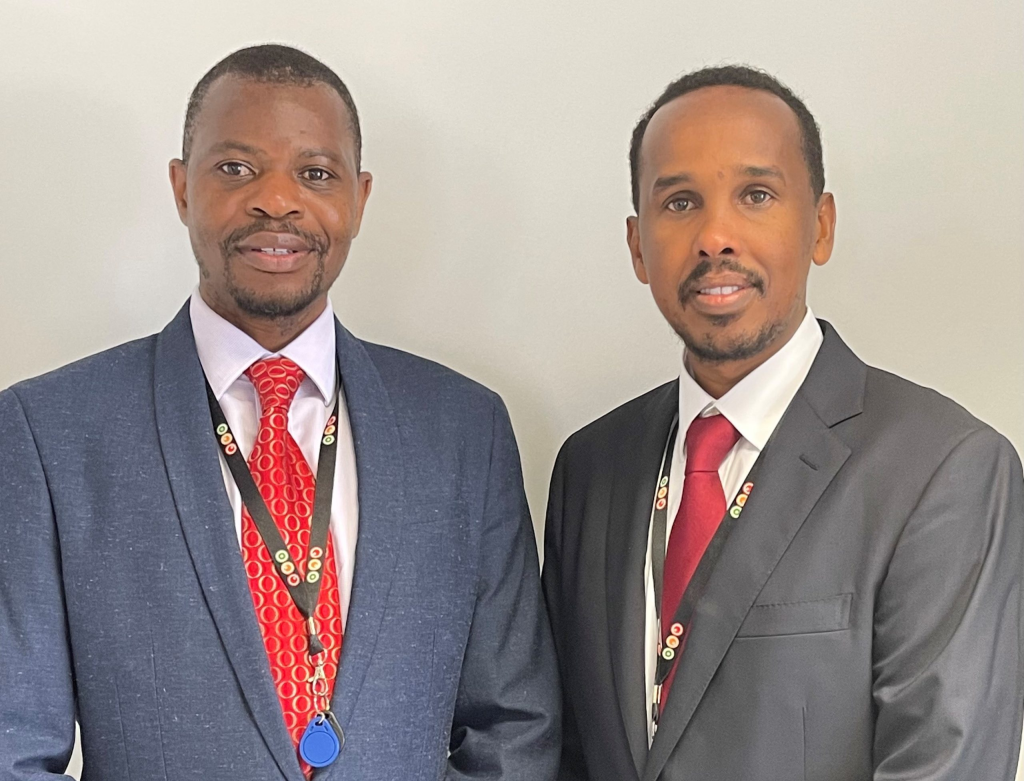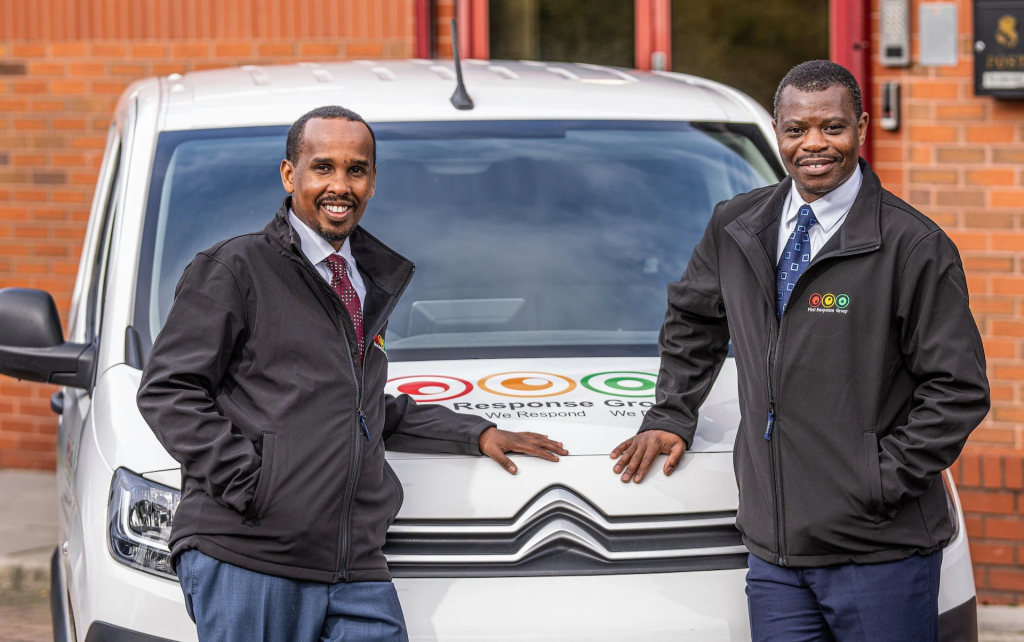In 2007, two immigrant security guards working adjoining buildings in Leeds found themselves sharing more than just their lunch breaks. They discovered they shared a burning frustration with their employers and an unshakeable belief that they could do better. These casual conversations during their breaks would eventually blossom into First Response Group, a multi-million-pound security and facilities management empire that now employs over 1,200 people across the UK and generates annual revenues exceeding $100 million.

Humble Beginnings in a Cold Room Above a Kebab Shop
The journey from security guards to business moguls wasn’t easy. When in 2007, Edgar Chibaka from Malawi and Jamal Tahlil from Somalia, decided to take the entrepreneurial leap, they had virtually nothing. “We started with virtually nothing,” Chibaka the Telegraph in 2022. Their entire operation began in what Chibaka unhappily describes as a “cold, run-down office” above an internet café and kebab shop in Leeds.
“There was no progression for me because of my skin colour,” Tahlil recalls of his experience working as a security guard. His friend Edgar Chibaka felt the same way. “You end up being frustrated — how long are you going to live with this frustration?”
With just one laptop between them and Tahlil’s credit card as their primary source of funding, they took the leap. They implemented a basic but effective system: a rota for researching contacts and sending emails. While building their business during the day, both men continued working night shifts as security guards to support their families.
“I said to Jamal: ‘we can do a better job if we do this on our own’ – so we took that gamble,” Chibaka told the Telegraph in 2022. It was a gamble that would define their lives.
The early days tested their resolve. Naturally. “We were new to the country, and had no friends or family in the business world – you need those contacts to help you get started,” says Tahlil, who was first to quit his job to launch the business. “That was really nerve-wracking, especially as I had a very young family at the time.”
Breaking Through the Barriers
The duo faced numerous challenges that went beyond typical startup struggles. As recent immigrants with no established networks or family wealth, they encountered systemic barriers that made building their business exponentially more difficult.
“We had so many doors closed to us because we didn’t have the client references back then,” says Chibaka. “But you keep going. Just because one door is closed, doesn’t mean they all are.”
One particularly memorable incident highlighted the discrimination they faced. “We went there with our files, insurance and brochures and they asked us to stand and make our case while they sat and had their nice coffee. We never had the chance to sit or even show them our brochures.”
Banking proved to be another significant hurdle. When they applied for loans, their status as renters rather than homeowners became a stumbling block. Tahlil was living in social housing at the time, which banks viewed unfavorably. “This is a big challenge people from black communities are facing,” adds Chibaka. “[Lenders are] looking for security, so brilliant ideas die out.”
They contrast this with the advantages available to more established communities: “We didn’t have this luxury,” Chibaka said, in reference to the generational wealth and established networks that other immigrant communities in Leeds possessed.
Their Winning Strategy: Focus on Where the Money Is
Despite these challenges, Chibaka and Tahlil developed a smart strategy that would prove crucial to their success. They decided to focus on construction, infrastructure and utility companies. These were sectors with reliable cash flow and the ability to pay bills promptly.
“The notion was that companies in these sectors have money and can pay the bills. The highways agency has money because we all pay our road tax. The gas and water companies have money because everyone has to pay their bills,” Chibaka explains.
Their first major break came with Network Rail, managers of Britain’s railways. “We offered them reactive guards. So whenever there was a strike or if someone called in sick, we would come in with replacements.”
The key to their success was their client-focused approach. “We listened more to the clients, understood their pain points and the journey they were on. They wanted a good partner who won’t just come and tell them how it should be done,” says Chibaka. This agility allowed them to win contracts from established players like G4S, including prestigious venues like London’s Wembley Stadium.

Building a People-First Culture
From the beginning, Chibaka and Tahlil were determined to create the kind of workplace they wished they had experienced as employees. Having felt overlooked and undervalued in their previous roles, they made employee care central to their business philosophy.
“There wasn’t much care about what we were doing and who we are as people,” recalled Chibaka of their former employers. “It was very much: get on with it.”
In contrast, First Response Group built its reputation on treating employees with dignity and respect. “We support and empower our staff,” explains Chibaka. “We’re a business that thrives on growing leaders from the inside. People join and we look for potential: what might that person have that nobody else knows? We spend time with our workers getting to know them, so we can get the best out of them.”
This approach includes maintaining an open-plan office where “we’re accessible. We’re not locked in the corner. People can speak freely, and we always respect and accommodate different views,” adds Tahlil.
Their employee-first philosophy extends to practical matters too. “If a cleaner can’t go and do a job because they don’t have a bus pass, the best thing I can do is give them the bus pass because if I don’t, I’d have a bigger problem with the client and can even lose the contract,” Chibaka explains.
Rapid Growth and Diversification
From their humble beginnings with one laptop, First Response Group has grown exponentially. The company now boasts 80 computers and laptops, directly employs 1,200 people and sometimes swells to 2,500 when providing temporary staff for major events.
The business has evolved far beyond basic security services. First Response Group now offers a comprehensive range of services, including security personnel, CCTV and access control systems, facilities management, cleaning, pest control, and grounds maintenance. Their client list includes high-profile names such as Axa Insurance, Legal & General, Abrdn, and the Elizabeth train line.
“I think we have a contract that is just one hour a week and another that is just two hours. But I tell the guys to do it just as well because they could have another need. They might ask us to come and look at their air-conditioners or boilers,” Chibaka notes, emphasizing their commitment to service excellence regardless of contract size.
The company has also made strategic acquisitions, including purchasing a struggling engineering firm to provide additional services in-house. When they realized how much they were spending on electronic security devices, they decided to manufacture them internally, tripling their profits with a $2.6 million investment.
Recognition and Future Ambitions
The success of First Response Group hasn’t gone unnoticed. In 2021, Chibaka and Tahlil were crowned businesspeople of the year at the Black British Business Awards, a recognition they dedicate to their “colleagues in the BAME (black, Asian and minority ethnic) community.”
“We’re humbled and feel empowered by the whole process,” says Chibaka, who hopes their success will inspire others: “It shows that if you’re determined and put in the hard work, the time will come for you to be recognised.”
The company has been attracting attention from private equity firms, with active discussions about potential investments of up to 40% stake. This could accelerate their growth beyond current projections of $300 million in three years. “We can easily accelerate this to probably half a billion,” Chibaka believes.

Lessons for Aspiring Entrepreneurs
Looking back on their journey, both founders offer realistic advice for aspiring entrepreneurs. “Being an entrepreneur is demanding. It’s really hard – it’s stressful,” says Chibaka. “Add to that all the nos and knockbacks and it’s easy to get stressed and depressed, so have some self-care and protect your mental health.”
However, their message is ultimately one of hope and possibility. “It’s not just our achievement, it’s that we can inspire people and not just black people, not just immigrants but the English people, the Scots, the Welsh. The people who are aspiring to go into business but don’t know how. Let them draw inspiration, their confidence, their self-esteem. That if Jamal and Edgar can do it then so can I.”
A Legacy of Determination
Today, Edgar Chibaka and Jamal Tahlil’s transformation from overlooked security guards to successful business leaders represents more than just personal achievement. Their story embodies the power of persistence, the importance of treating people with dignity, and the potential that exists when determination meets opportunity.
“We don’t just want to be seen as role models, we want to be seen as people who are capable,” says Chibaka. From a cold room above a kebab shop to a multi-million-pound empire, First Response Group is the story of what’s possible when two people refuse to accept limitations and choose instead to build something better.
Just like Ikenna Ordor, another immigrant who has built a multi-million business in the UK, home has also remained in their minds. Despite some setbacks, including a $3.9 million loss on an Ethiopian abattoir project, Chibaka remains bullish on exploring African opportunities. “Three weeks ago I was in Uganda, Tanzania and Kenya. We are looking at security opportunities across the continent and there are just too many.” In Malawi, his homeland, Chibaka has already established a security business and acquired a small microfinance institution with plans to apply for a banking license within five years.
As they continue to expand the operations of First Response Group and explore new opportunities, Chibaka and Tahlil remain committed to the principles that got them started: treating people well, delivering exceptional service, and never giving up, no matter how many doors get slammed in your face.

Ready to turn your business dreams into reality?
Our SimplVest Monthly2K Course gives you the step-by-step blueprint to start and grow a business. You will learn in 10 actional modules, how to validate ideas, launch efficiently and scale smartly just like the pros. The first two modules are free, so you can start risk-free. When you buy it, you get additional materials, including a database of 100+ side hustles to choose from, access to a community of entrepreneurs and marketing templates, all for free.












